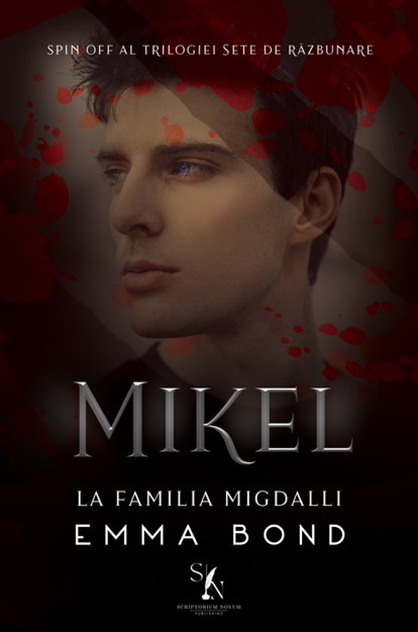- Rating: ★★☆☆☆
- Pagini: 300
- Goodreads: Mikel
- Poate fi cumpărată de aici: https://www.scriptorium-novum-publishing.ro/p/mikel-la-familia-migdalli-spin-off/
„Mikel” de Emma Bond mi-a atras atenția prin tema puternică și promisiunea unei povești emoționante, dar lectura nu a fost deloc ceea ce speram. Deși romanul pornește de la o realitate dură — abandonul, suferința, lupta pentru identitate — modul în care este scris mi s-a părut greoi, confuz și uneori prea pretențios pentru o poveste care ar fi trebuit să ajungă la inimă, nu doar la minte.
Totul începe cu Isabella, o tânără mamă care, copleșită de frică și neputință, își lasă copilul nou-născut într-un orfelinat care funcționează într-o fostă mănăstire. Așa începe viața lui Mikel – un băiețel crescut fără mamă, într-un loc rece și auster. Mikel este un copil inteligent, rebel și curios, cu o nevoie puternică de libertate și de a înțelege cine este și de unde vine.
Din păcate, felul în care este construit personajul m-a ținut mereu la distanță. Nu am reușit să-l simt aproape, deși povestea lui este tragică. Stilul narativ este uneori atât de încâlcit și poetic, încât uitam că citesc despre viața unui copil. Mi-a lipsit emoția sinceră. De multe ori, mi s-a părut că romanul încearcă prea tare să fie „literar”, dar uită să fie clar și uman.
Ajuns în grija familiei Migdalli — o familie bogată, influentă, dar cu multe umbre și secrete —, Mikel intră într-o nouă lume. Aici găsește prietenie, dar și invidie, pericole și întrebări fără răspuns. Legătura cu Antonio, fiul adoptiv al familiei, este poate partea cea mai frumoasă din carte. Cei doi se apropie mult, iar prietenia lor devine una dintre puținele ancore stabile în viața haotică a lui Mikel. Totuși, nici acest fir narativ nu este suficient explorat. Totul rămâne vag, plin de simboluri și metafore greu de urmărit.
Pe parcurs, cartea alternează momente de tandrețe cu scene tensionate, în care apar și elemente legate de mafia italiană. Însă toate aceste schimbări de ton m-au obosit. Nu am reușit să mă atașez de niciun personaj secundar, pentru că nu sunt suficient de bine conturate. Se vorbește despre identitate, apartenență, iubire și curaj, dar toate aceste teme mari sunt prezentate într-un mod care nu m-a atins cu adevărat.
Am terminat cartea cu o senzație de gol. Povestea lui Mikel ar fi putut fi sfâșietoare, dar pentru mine a fost mai degrabă un labirint de fraze complicate, cu prea puțină emoție reală. Recunosc că autoarea are un stil aparte, dar în cazul acestui roman, am simțit că forma a fost mai importantă decât conținutul.
O carte care avea potențial, dar care, din păcate, nu a reușit să mă convingă.

Mikel – Emma Bond (La familia Migdalli, #spin off)
“Mikel” by Emma Bond caught my attention with its powerful theme and the promise of an emotional story, but the reading experience was not at all what I had hoped for. Although the novel begins with a harsh reality — abandonment, suffering, the struggle for identity — I found the writing style heavy, confusing, and at times overly pretentious for a story that should have reached the heart, not just the mind.
It all starts with Isabella, a young mother who, overwhelmed by fear and helplessness, leaves her newborn child at an orphanage operating in a former monastery. This is how Mikel’s life begins — a boy raised without a mother, in a cold and austere place. Mikel is an intelligent, rebellious, and curious child, with a deep need for freedom and to understand who he is and where he comes from.
Unfortunately, the way the character is built kept me at a distance. I couldn’t feel close to him, even though his story is tragic. The narrative style is sometimes so tangled and poetic that I would forget I was reading about a child’s life. I missed the raw, genuine emotion. Many times, it felt like the novel was trying too hard to be “literary,” but forgot to be clear and human.
When he comes under the care of the Migdalli family — a wealthy, influential family with many shadows and secrets — Mikel enters a new world. Here he finds friendship, but also envy, danger, and unanswered questions. His bond with Antonio, the family’s adopted son, is perhaps the most beautiful part of the book. The two grow very close, and their friendship becomes one of the few steady anchors in Mikel’s chaotic life. However, even this narrative thread is not explored enough. Everything remains vague, full of symbols and metaphors that are hard to follow.
Throughout the book, moments of tenderness alternate with tense scenes, including elements related to the Italian mafia. But all these tone shifts left me exhausted. I couldn’t get attached to any secondary character, as none of them are well developed. The novel touches on themes like identity, belonging, love, and courage, but these big topics are presented in a way that never truly resonated with me.
I finished the book with a sense of emptiness. Mikel’s story could have been heartbreaking, but for me, it was more like a maze of complicated sentences with too little real emotion. I admit the author has a distinct style, but in this novel, it felt like form was more important than substance.
A book with potential, but unfortunately, one that failed to convince me.

